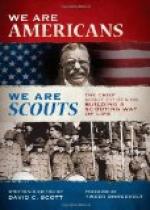The next morning the Capt. was up before I was awake, and he and his men had counted the horses that the Indians had. He came back as I was just getting up and said, “Guess how many horses there are in the bunch we have taken?”
“I counted a hundred and twenty-five last night,” I answered.
He said, “You are a pretty close guesser. There are just one hundred and thirty-two in the band, and some of them are as fine work horses as I ever saw in Texas. It is a mystery to me where the Indians get such nice horses. Do you think it possible that these wretches have been into Kansas and robbed the people there?”
I said, “It would be hard to tell, Capt., where they got them, for they go anywhere that they think there is anything to steal.”
After we had eaten breakfast, Capt. McKee proposed that he and I go to the settlement alone and leave the men in camp until we came back. He said that the settlement was no more than five or six miles from where we then were in camp, and perhaps we could get some information in regard to where the Indians had been stealing stock and doing other depradations to the settlers.
When the Capt. told the men what we proposed doing, one of them said, “That just suits me for one, for we are out of meat, and while you are gone we can go hunting and have a new supply when you get back.”
The Capt. said, “All right, but take care of the horses and not let any of them get away, and don’t look for us until we come back.”
We mounted our horses and struck out for the settlement. A two-hours ride brought us there, and we found that Capt. McKee was acquainted with most of the settlers, and they welcomed us gladly, for at that time when everyone had to travel on horseback or walk. There was not so much visiting, and the sight of a friendly face was very pleasing to the people who lived at those isolated settlements.
When we inquired if the Indians troubled them, they said the Indians had not raided that place in three months, but about three weeks before someone saw a band of about twenty-five Indians going towards the east, and they were the last Indians that had been seen in that neighborhood, but they had heard that the Apache Indians had been doing considerable mischief fifty miles or so further south, but they did not know whether the report was true or not, and they of this settlement had been careful to have their stock cared for by herders through the day, and at night they were put in the corral.
The Captain asked if we could make arrangements with them to take charge of over a hundred head of horses for a month or so, and if so to care for the same as their own by day and at night. The man we were talking to said that his son had charge of the stock in the daytime and would be at the house for dinner, and that we had better stay and have a talk with him.
It was not long before the young man came in, and the Captain asked him what he would charge to herd a few more than a hundred horses for a month, or longer. The young man said that he would take them at twenty-five dollars a hundred, and we could leave them with him as long as we pleased at that price, and that they should have the best of care while he had the charge of them.




